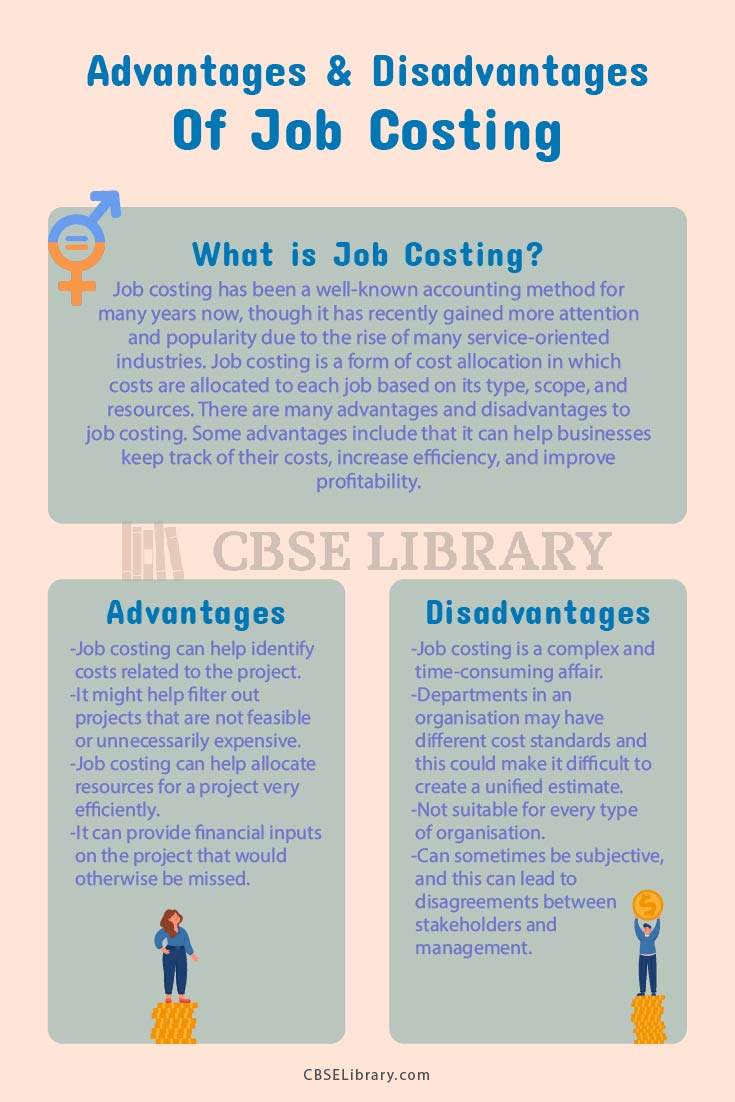Job Costing Advantages And Disadvantages 2022: Job costing has been a well-known accounting method for many years now, though it has recently gained more attention and popularity due to the rise of many service-oriented industries. Job costing is a form of cost allocation in which costs are allocated to each job based on its type, scope, and resources. There are many advantages and disadvantages to job costing. Some advantages include that it can help businesses keep track of their costs, increase efficiency, and improve profitability. On the other hand, job costing can also be difficult to use and can be time-consuming. In this article, we shall learn about the pros and cons of this accounting method as well as its implications in detail.
Students can also find more Advantages and Disadvantages articles on events, persons, sports, technology, and many more.
- Advantages of Job Costing
- Disadvantages of Job Costing
- Comparison Table for Advantages and Disadvantages of Job Costing
- Conclusion on Job Costing – Advantages And Disadvantages
- FAQs on Advantages And Disadvantages of Job Costing
Advantages of Job Costing
As discussed above, job costing is a process of estimating the total cost of a job, including all direct and indirect costs. It is used to determine how much money will be needed to complete the project. There are many benefits to using job costing:
- It helps to identify and track costs related to a specific project.
- It can help identify where money is being spent unnecessarily or on projects that are not necessary.
- It can help to determine the most efficient way to allocate resources for a project.
- It can help to make decisions about whether or not to continue with a project.
Disadvantages of Job Costing
The benefits of job costing are clear: accurate estimates of costs and resources enable decision-makers to make informed choices, plan more effectively, and ensure that projects are completed on time and within budget. However, job costing also poses some challenges:
- First, it can be complex and time-consuming to collect accurate data.
- Second, different departments may have different cost standards, making it difficult to create a single, unified estimate.
- It may not be applicable to every type of organisation.
- Finally, estimating job costs can be subjective, which can lead to disagreements among stakeholders about the final cost of a project.

Comparison Table for Advantages and Disadvantages of Job Costing
Following are the advantages and disadvantages of Job Costing:
| Advantages | Disadvantages |
| Job costing can help identify costs related to the project. | Job costing is a complex and time-consuming affair |
| It might help filter out projects that are not feasible or unnecessarily expensive | Departments in an organisation may have different cost standards and this could make it difficult to create a unified estimate. |
| Job costing can help allocate resources for a project very efficiently | Not suitable for every type of organisation. |
| It can provide financial inputs on the project that would otherwise be missed | Can sometimes be subjective, and this can lead to disagreements between stakeholders and management |
Conclusion on Job Costing – Advantages And Disadvantages
There are many advantages to using job costing methods when managing a business. One major advantage is that it can help managers keep track of the overall cost of a job. This information can be used to make decisions about which jobs to bid on and which jobs to outsource.
Job costing also helps managers to better understand the budgetary impacts of their decisions. Secondly, it can help managers to track their expenses over time so they can make informed decisions about whether or not to continue investing in a given area of the business. Finally, it can give a better understanding of where the profits are coming from and where they could potentially be improved. There are also several disadvantages to using the job costing method: The first disadvantage is that it can be difficult to keep track of expenses. Second, job costing can be inaccurate because it assumes that all costs are fixed. Finally, job costing can be difficult to use when assessing the profitability of a project.
In conclusion, When businesses decide how to spend their money, they have to take into account both the short-term and long-term benefits. The job costing method is a way of understanding these benefits and figuring out which costs are necessary for a particular project. It helps businesses make decisions about how to allocate their resources in the most efficient way possible.
FAQs on Advantages And Disadvantages of Job Costing
Question 1.
What is Job Costing?
Answer:
The job costing method is a method of calculating the cost of a job. It helps businesses to figure out how much it will cost to produce a specific product or service. The method takes into account many factors, including the materials used, the number of hours required, and the wages paid to workers.
Question 2.
What are the advantages of Job Costing?
Answer:
There are many advantages to using a job costing method in business. It can help to keep track of the various expenses associated with a particular project, which can save time and money. It can also help to identify any overspending or under-investing that may be happening. Lastly, it can help to make better decisions about where to allocate resources between different projects.
Question 3.
What are the disadvantages of Job Costing?
Answer:
There are several disadvantages to using the job costing method. The first disadvantage is that it can be difficult to track the progress of a project. This is because of the various costs that are associated with a job change over time. For example, the cost of materials may increase after the job has been completed, while the cost of labour may decrease. Second, job costing can be misleading. It can give the false impression that all jobs are alike and that it is possible to estimate expenses for any project without actually doing the calculations. Third, job costing does not take into account opportunity costs. This means that it does not consider how much resources could have been used in other projects if they were allocated to this one instead.
Question 4.
Why are Job Costs important?
Answer:
Job costing is important for several reasons. First, it can help managers make better decisions about how to allocate resources. Second, it can help managers determine how profitable a particular job is. Finally, it can help managers track the actual costs associated with a particular job.
